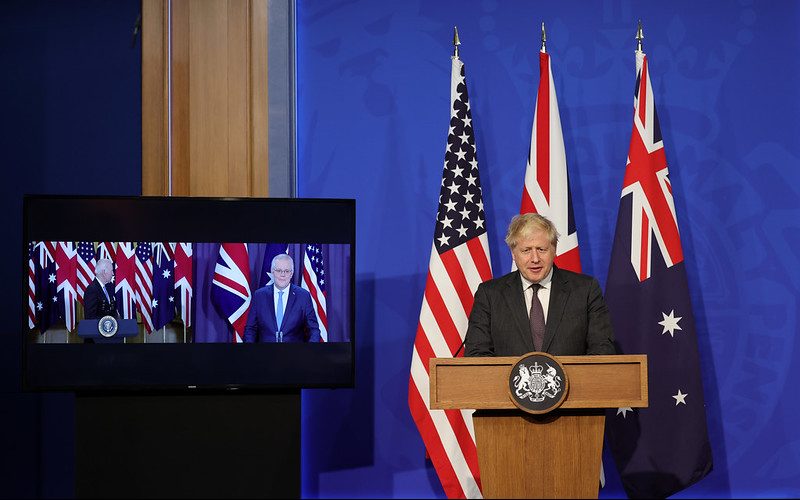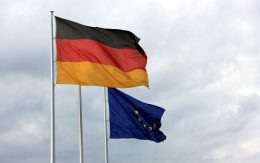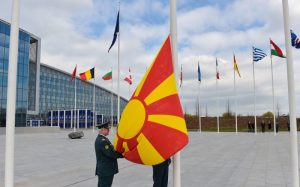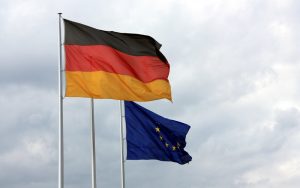Australia has just become part of something momentous in the Indo-Pacific: a maritime super-region at the epicentre of strategic competition between the United States and China. The new tripartite security grouping between Australia, the UK and the US, called AUKUS, deepens the long-standing relationship between three of the world’s most multicultural democracies. The first initiative will see teams from both countries develop a joint plan for Australia’s new nuclear submarine fleet over the next 18 months. Only France, Russia, China and India – in addition to the United States and the United Kingdom – have this type of submarine, which improves on the conventional submarine by allowing it to operate for long periods of time without needing to surface as frequently.
The new security triangle represents a dramatic strengthening of security ties between three already close allies. The three countries share close intelligence collaboration across the Western world’s premier spy alliance – the Five Eyes – and the foreign and defence ministers of the three countries hold regular ministerial consultations to deepen strategic convergences of mutual concern. The fact that the announcement of the new strategic partnership was made in a rare joint virtual press conference between the three leaders – rather than a casual press release – underscored the importance that the three partners have invested in taking this partnership to the international stage.
While the submarine venture has made headlines, the AUKUS partnership is far more significant in that it will allow Australia, the UK and the US to extend their cooperation across a wide range of defence capabilities and key technology areas. In particular, the three leaders identified artificial intelligence, cyber capabilities and quantum computing as priority areas for cooperation. At the same time, Prime Minister Morison is seeking US support and technical expertise to develop a Sovereign Guided Weapons and Explosive Ordnance Enterprise to manufacture long-range strike missiles in Australia. As the Biden administration seeks to inject new impetus and purpose into US security policy after its abrupt departure from Afghanistan, it is important to ascertain whether the newly formed defence pact will be sufficient to contain China’s growing bellicose activities in the Indo-Pacific region.
Multiplication of Chinese manoeuvres at sea
Located at the crossroads of South, Southeast and North Asia, the South China Sea occupies a critical geographical position. The sea lanes that cross it provide the shortest route between the Pacific and Indian Oceans and function as vital arteries for global trade and energy shipments. Southeast Asian countries such as China, Vietnam, the Philippines, Brunei, Malaysia and Taiwan have been disputing over the contours of the South China Sea region for centuries. While Beijing has never defined these waters as its own, it has depicted its historical claims on official maps by a nine-dashed line that encompasses more than 80% of the sea. China’s definitions include its claim to the Spratly and Paracel Islands and the sea lanes – which are the commercial lifeline for neighbouring countries and many other nations, including Australia, Japan and South Korea.
Since becoming General Secretary of the Chinese Communist Party in 2012, Xi Jinping’s China has radically moved away from the low-key diplomatic methods of Deng Xiaoping to an increasingly muscular and confrontational foreign policy. Recent developments have confirmed that China is willing and able to take decisive steps in this vast and strategically crucial body of water. In April 2020, a Chinese coast guard vessel sank a Vietnamese fishing boat near the disputed Paracel Islands, triggering a wave of diplomatic protests throughout the region. China also unilaterally declared two new administrative regions in the South China Sea – confirming its desire to devote more manpower and resources to its artificial islands and to strengthen its military presence. While the world was focused on events in Afghanistan in August, the CCP unilaterally imposed a new law requiring foreign ships to give advance notice before entering waters it claims as its own.
Across the 180-kilometre-wide strait that separates the island of Taiwan from mainland Asia, cross-strait tensions have intensified since the election of President Tsai Ing-wen in 2016. Upon taking office, Taiwan’s first female president sought to take a hard line against the mainland – in a complete policy reversal from former Kuomintang leader Ma Ying-jeou. But as President Xi achieves complete subjugation of Hong Kong, China’s supreme leader is now turning his attention towards Taiwan in the hope of achieving reunification before 2049, the centenary of the CCP’s founding. To this end, China has stepped up its military coercion this year sending regularly warships and fighter jets off the island’s southwest and southeast. As Beijing seeks to increase its production of technologically advanced warships and submarines, while striving to constantly improve the targeting capabilities of fighter jets, this backdrop should be a source of concern for liberal powers of the Indo-Pacific.
What role for other like-minded alliances and partners?
While the creation of the newly-formed AUKUS is a significant development in the geopolitical environment of the Indo-Pacific, adding more power will be vital in building a balance against China’s power. This imperative comes as China seeks to construct an alliance of authoritarian powers with Pakistan, Russia and Iran in a strategic counter-reaction to the growing US-led coalition groups in the Indo-Pacific. This is added further importance as China seeks to achieve naval supremacy by 2030 with the production of over 450 ships, and a submarine force approaching 1109 submarines.
Since entering the Oval Office, Joe Biden has made strengthening US partnerships with like-minded democracies in the Indo-Pacific a priority of his China containment strategy. In particular, President Biden has sought to deepen his relationship with the Quadrilateral Security Dialogue – also known as the Quad – which encompasses Australia, the United States, Japan and India. In an effort to achieve peace and security in the Indo-Pacific region, the Democratic Quad has notably stepped up its operational engagements, with coalition partners meeting for four days of mega naval war games off the shores of Guam in August. Leaders of the Democratic Quad also held their maiden physical summit in Washington last month, where discussions focused on boosting critical technology supply lines and working together to deliver COVID-19 vaccines to needy countries in the Indo-Pacific.
Unfortunately, the AUKUS defence pact has managed to alienate France in the process. France has been significantly miffed by the new AUKUS trilateral, given the considerable financial implications of losing its $40bn defence agreement forged with Australia in 2016 to supply a fleet of conventional submarines. The importance of the submarine contract for France cannot be underestimated. Negotiated between 2014 and 2016, it resulted in a strategic partnership that was supposed to form the framework for French-Australian relations for the next 50 years. It was a key piece of the Indo-Pacific strategy structured around the Paris-Delhi-Canberra axis that President Emmanuel Macron promoted in 2018 in a speech at the Garden Island military base in Sydney. By losing the multi-billion dollar submarine contract, France has reiterated calls for the European Union to forge greater military and defence autonomy.
But as the West faces unprecedented challenges in the Indo-Pacific region, a united transatlantic partnership is essential to deal with China. France remains an important partner for all Quad members – it has 8,000 troops in the region, more than any other country apart from the US – ready to enforce, if necessary, the rules-based regional order by armed force. The high levels of synergy, coordination and interoperability between France and the Quad navies were notably showcased during complex maritime exercises in the eastern Indian Ocean earlier this year. In addition to this, Japanese, American and French troops held their first-ever joint exercises on Japanese territory earlier this year, simulating the defence of an island against an enemy invasion aimed at China.
President Biden has at least sought to find a way out of this diplomatic crisis. The current occupant of the White House held a half-hour call with President Macron last month, during which Biden pledged additional US support for France’s counter-terrorism campaign in the Sahel. US Secretary of State Antony Blinken has also stepped up talks with his French counterpart Jean-Yves Le Drian at the United Nations headquarters. These gestures have led France to return its ambassador to the US. Nevertheless, the meeting scheduled between Biden and Macron at the end of the month will be crucial to reaffirm the deep ties between the two powers on the international stage and, more crucially, to build on the ‘Quad plus one’ military cooperation in the Indo-Pacific region.
Sources Atlantic Council experts. (2021) Experts react: The US withdrawal from Afghanistan is complete. What’s next?, Atlantic Council, Washington: United States. Australian Government Department of Defence. (2021) Morrison Government accelerates Sovereign Guided Weapons manufacturing, Australian Government Department of Defence March 31, 2021. BBC News. (2021) Aukus: French minister condemns US and Australia ‘lies’ over security pact, BBC. Beech, H. (2016) Just Where Exactly Did China Get the South China Sea Nine-Dash Line From?, Time, June 19, 2016. Chaudhury, R,D. (2021) First Quad physical summit planned at end of September in Washington, The Economic Times, August 21, 2021. Dr Adityanjee, A. (2021) Clash of Alliances: A geopolitical churn is going on, Sunday Guardian Live, August 7, 2021. France 24. (2021) French ambassador will return to US as Biden, Macron seek to restore ‘confidence’, France 24, September 22, 2021. Grant, S. (2021) Macron’s submarine spat is a reminder of why Australia ought to be getting closer to France, not alienating it, ABC, October 2, 2021. Jackson, F. (2021) Restoring relations will require ‘time and actions’, French foreign minister tells Blinken, France 24, September 23, 2021. Jha, L.K. & Khana, A. (2021) US, Britain & Australia announce new trilateral Indo-Pacific alliance ‘AUKUS’, The Print, September 16, 2021. Knott, M. (2021) ‘We favour freedom’: Quad leaders offer China alternative at historic summit, The Sydney Morning Herald, September 25, 2021. Krishnankutty, K. (2020) Not just India, Tibet — China has 17 territorial disputes with its neighbours, on land & sea, The Print, July 15, 2020. Lee, Y & Tian, L, Y. (2021) China holds assault drills near Taiwan after ‘provocations’, Thomson Reuters, August 17, 2021. Lendon, B & George, S. (2021) The long arm of China’s new maritime law risks causing conflict with US and Japan, CNN, September 3, 2021. Meunier, S. (2021) What’s the big ruckus over the new defense partnership with the U.K. and Australia?, The Washington Post, September 17, 2021. Nikkei Staff Writers, Quad leaders to call for securing chip supply chain, Nikkei Asia, September 18, 2021. Reuters Staff. (2018) Macron wants strategic Paris-Delhi-Canberra axis amid Pacific tension, Thomson Reuters, May 2, 2018. Sinhu, S. (2021) Quad navies join France-led drills in Indian Ocean, The Hindustan Times, April 5, 2021. Suciu, P. (2020) China Could Have Naval Dominance by 2030 and Naval Superiority by 2049?, The National Interest, August 12, 2020. Thomas-Noone, B. (2019) Ebbing Opportunity: Australia and the US National Technology and Industrial Base. United States Studies Centre at the University of Sydney, Sydney: Australia. Vu, K. (2020) Vietnam protests Beijing’s sinking of South China Sea boat, Thomson Reuters, April 4, 2020. Wintour, P. (2021) Aukus pact: France to send ambassador back to US after Macron-Biden call, The Guardian, September 22, 2021. Wintour, P. (2021) Recall of ambassadors indicates extent of Aukus anger in France, The Guardian, September 18, 2021.








Be First to Comment